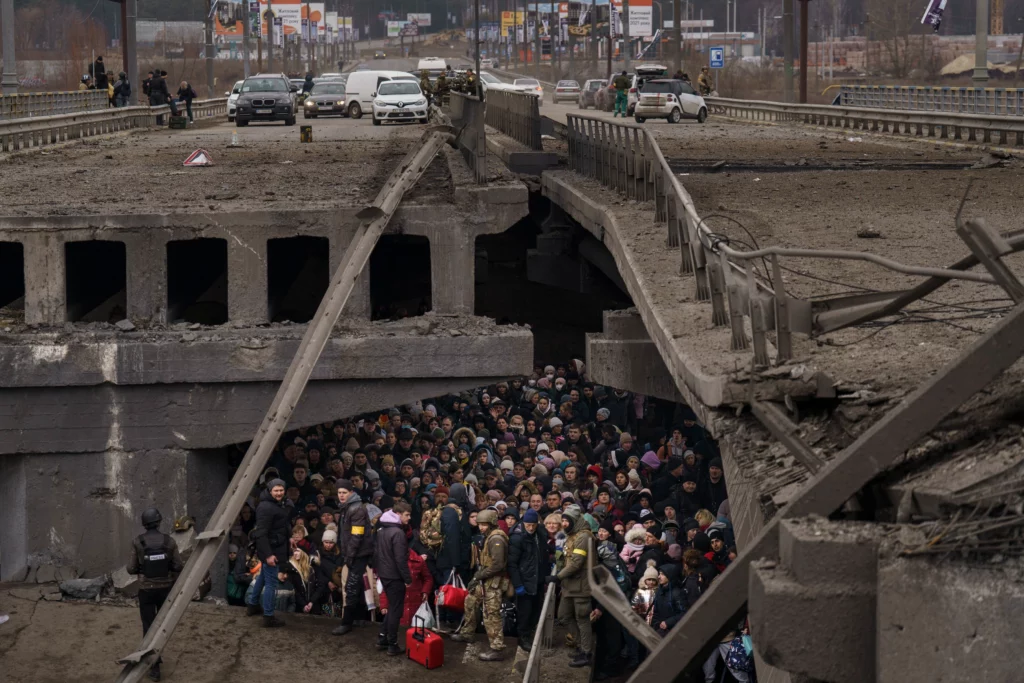
Raúl Zibechi
Every day the horrors of the war in Ukraine, the terrible consequences of the weapons on the bodies and their living environment, are becoming more and more apparent to us. It is remarkable, however, that the media mention, above all, the material destruction of historical and emblematic buildings, bridges and other infrastructure and war material, which always makes the front pages and headlines.
Human beings barely occupy the margins, because they are increasingly considered to be collateral damage, since what really matters is the value of things. A typical attitude of capital that is increasingly being assumed by the system’s leftists. Something similar happens with geopolitics.
It is news, for example, when a renowned Ukrainian TV journalist, Yanina Sokolova, shares the pain of soldiers on her social networks, the amputated body of one wounded in war, full of physical traumas and injuries. She feels bad 24 hours a day, she writes ( La Stampa, 7/21/23). To soothe the pain and damage to his body he must take opiates, which also have negative consequences.
Days ago the parliament voted, with urgency, on the legalization of marijuana for medicinal purposes, something it had previously refused to do, in order to alleviate the terrible suffering of soldiers and civilians devastated by the conflict, La Stampa’s text points out.
She adds that one of the effects of the war is the exponential growth of the demand for cannabis and psychoactive substances in Ukraine and Russia, used as tranquilizers, anesthetics against pain and hallucinations, and even as a stimulant in cases of deep depression.
Apparently, the relationship between war and drugs is very strong. After the Vietnam War, there was massive heroin use among former US soldiers, to such an extent that successive governments had to finance programs to deal with dependency.
Current accounts of war seek to conceal the human beings. General data abound (military offensives, type of weapons used, photos and videos of the destruction, number of dead and wounded), but rarely do the mutilated and mangled bodies that are the daily fare in combat zones appear. War is, as they say these days, a meat grinder. Specialists assure that the life expectancy of a soldier on the front lines is barely four hours.
Geopolitics also hides the people. It teaches which nations can benefit from war and which can lose. It insists on analyzing the strategic results in the global balance of power. From the Latin American left, more than a few people congratulate themselves on a possible defeat of the Western camp and in particular of the United States. They believe that a triumph of Russia and China will bring benefits to the working classes. They overlook the sufferings of women, youth and the peoples of these countries, and focus only on the macro scale of international relations.
Geopolitics is at odds with ethics, as is war. And this also happening on the left, which was born to put human beings first, while the right was concerned with material gain and power. As we know, the differences between left and right have disappeared, being the greatest cultural and political defeat imaginable.
This is not to say that the data and analysis coming from geopolitics are of no consequence for the people. But it is one thing to take them into account and quite another to subordinate oneself to their logic, always that of the state and imperialism. Something similar happens with the economy: it is necessary to pay attention to its contributions, but the economic drift among those from below implies a capitulation to the technocracies that manage it.
This drift implies placing at the center of thought and action the supposedly implacable economic laws that would lead peoples to their liberation, instead of considering social conflict as the heart of emancipation.
Now that geopolitics enjoys so many followers, it seems important to point out its limitations, which are more social than intellectual. I will give an example: I believe that the fall of Daniel Ortega’s regime in Nicaragua would benefit the United States, which is why China and Russia support him. None of them think about the Nicaraguan population, which suffers every day with an intolerant and repressive regime.
On this point there is no way to make a mistake: one thinks from and with the oppressed peoples or one embraces the logic of power and the damned balance of forces. Something dreadful is happening before us: all facets of life are being approached as if it were a soccer match. It hurts those of us who enjoy that sport. But it hurts even more for those of us who still believe that it is worth playing for the human beings of this world, regardless of where they live.
Original text published in La Jornada on July 28th, 2023. https://www.jornada.com.mx/2023/07/28/opinion/019a1pol
English translation by Schools for Chiapas.
